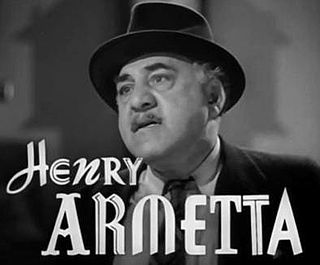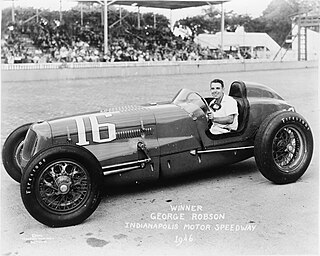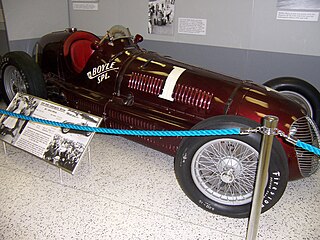
The Indianapolis 500, formally known as the Indianapolis 500-Mile Race, and commonly shortened to Indy 500, is an annual automobile race held at the Indianapolis Motor Speedway in Speedway, Indiana, United States, an enclave suburb of Indianapolis. The event is traditionally held over Memorial Day weekend, usually the last weekend of May. It is contested as part of the IndyCar Series, the top level of American open-wheel car racing, a formula colloquially known as "Indy car racing". The track itself is nicknamed the "Brickyard", as the racing surface was first paved in brick in the fall of 1909. One yard of brick remains exposed at the start/finish line. The event, billed as The Greatest Spectacle in Racing, is considered part of the Triple Crown of Motorsport along with the 24 Hours of Le Mans and the Monaco Grand Prix, with which it typically shares a date.

The Indianapolis Motor Speedway is a motor racing circuit located in Speedway, Indiana, an enclave suburb of Indianapolis, Indiana. It is the home of the Indianapolis 500 and the Brickyard 400 and formerly the home of the United States Grand Prix and Indianapolis motorcycle Grand Prix. It is located six miles (9.7 km) west of Downtown Indianapolis.

Henry Armetta was an American character actor who appeared in at least 150 American films, beginning in silent movies. His last film was released posthumously in 1946, the year after his death.

The 30th International 500-Mile Sweepstakes was held at the Indianapolis Motor Speedway on Thursday, May 30, 1946. This was the first Indianapolis 500 presided over by new track owner Tony Hulman. The track had closed in late 1941 due to World War II, and over the next four years, the facility fell into a terrible state of disrepair. Hulman purchased the Speedway in November 1945, and quickly went to work cleaning up the grounds, which had become overwhelmed by overgrowth and weeds. The Speedway re-opened, and the 1946 race was considered a rousing success.

The 7th Liberty 500-Mile Sweepstakes was held at the Indianapolis Motor Speedway on Saturday, May 31, 1919.

The 32nd International 500-Mile Sweepstakes was held at the Indianapolis Motor Speedway on Monday, May 31, 1948.

The 27th International 500-Mile Sweepstakes Race was held at the Indianapolis Motor Speedway on May 30, 1939. The race was won by the number two car of Wilbur Shaw, who started in the third position, driving a Maserati 8CTF. The race was notable for a three car accident on lap 109, when Floyd Roberts, the reigning champion, was killed when his car went through the wooden outer wall at over 100 miles (160 km) an hour at the backstretch. In Louis Meyer's final Indy 500, he too would crash at the backstretch at over 100 miles (160 km) an hour, but he walked away unharmed.
The 24th International 500-Mile Sweepstakes Race was held at the Indianapolis Motor Speedway on Saturday, May 30, 1936. The race was part of the 1936 AAA Championship Car season. The race is remembered for three noteworthy Indy traditions getting their start.

The 12th International 500-Mile Sweepstakes Race was held at the Indianapolis Motor Speedway on Friday, May 30, 1924.

The 4th International 500-Mile Sweepstakes Race was held at the Indianapolis Motor Speedway on Saturday, May 30, 1914.

Jay Howard is a British professional race car driver who competes in the IndyCar Series and Indianapolis 500 and resides in Indianapolis, Indiana. Howard was the 2005 US Formula Ford Zetec champion and moved up to the Indy Lights series, where he captured two wins on his way to the 2006 championship for Sam Schmidt Motorsports in his rookie season. He qualified for his first Indianapolis 500 in 2011.
The Indianapolis 500 auto race has been the subject for several motion pictures. It has also received countless references in television, film, commercials, books, and other media. The following is a list of such references.

Tom Carnegie, born Carl Lee Kenagy, was an American radio and television broadcaster, public-address announcer, sports columnist, documentary filmmaker, and educator from Norwalk, Connecticut. Carnegie's radio and television broadcasting career, which spanned from 1942 to 1985, included work at KITE radio in Kansas City, Missouri; WOWO (AM) radio in Fort Wayne, Indiana; and WIRE (AM) radio in Indianapolis, Indiana. Carnegie was also sports director for WRTV television in Indianapolis for thirty-two years, and broadcast the Indiana high school boys' basketball tournament for twenty-four years.
Robert Elwood Carey was an American racing driver. He was the AAA National Champion in 1932.

The Indianapolis Motor Speedway Museum is an automotive museum on the grounds of the Indianapolis Motor Speedway in Speedway, Indiana, United States, which houses the Indianapolis Motor Speedway Hall of Fame. It is intrinsically linked to the Indianapolis 500 and Brickyard 400, but it also includes exhibits reflecting other forms of motorsports, passenger cars, and general automotive history. In 2006, it celebrated its 50th anniversary. The museum foundation possesses several former Indianapolis 500 winning cars, and pace cars, and they are regularly rotated onto the display floor exhibits.

Race results from the automobile and motorcycle races contested at the Indianapolis Motor Speedway in Speedway, Indiana. Races have been held on seven different track configurations:

The Crowd Roars is a 1932 American pre-Code drama film directed by Howard Hawks starring James Cagney and featuring Joan Blondell, Ann Dvorak, Eric Linden, Guy Kibbee, and Frank McHugh. A film of the same name was made in 1938 with a different story, starring Robert Taylor.

Speedway is a 1929 American synchronized sound drama film directed by Harry Beaumont and starring William Haines, Anita Page and Ernest Torrence. The film has no audible dialogue but featured a synchronized musical score and sound effects. The soundtrack was recorded using the Western Electric Sound System sound-on-film process. The soundtrack was also transferred to discs for those theatres that were wired with sound-on-disc sound systems. This was Haines' last film without dialogue.















